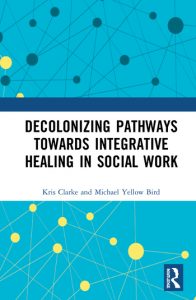VIDEO: Decolonizing Pathways Towards Integrative Healing in Social Work
Categories: Ashley Quinn, Indigenous Trauma and Resiliency field of study, Rupaleem BhuyanThis spring, the Factor-Inwentash Faculty of Social Work held a two-hour workshop on Decolonizing Pathways Towards Integrative Healing in Social Work, inspired by Michael Yellow Bird and Kris Clarke’s book of the same name. The event featured an introduction from Assistant Professor Jane Middelton-Moz, a dialogue with the authors, and a panel discussion with two graduates from FIFSW’s Master of Social Work Indigenous Trauma and Resiliency (ITR) Field of Study: grassroots community leaders Lisa Robinson and Germaine Elliot.
Hosted by Associate Professor Rupaleem Bhuyan and Assistant Professor Ashley Quinn, the workshop created a space for participants to strengthen their knowledge and commitment to holding social work accountable for its historic and ongoing complicity in colonial practices. The event explored social movements and Indigenous resistance to colonial violence, and aimed to create pathways for knowledge that has been closed by colonial systems.
For those who were unable to attend the workshop — and for those who would like to view the discussion again — videos of the event have now been published.
Part 1 Welcome & Opening remarks from Jane Middelton-Moz
Part 2 Dialogue with Kris Clarke and Michael Yellow Bird, authors of Decolonizing Pathways Towards Integrative Healing in Social Work
Part 3 Panel Discussion with Grassroots Leaders Engaged in Decolonizing Healing Practices: Germaine Trudeau-Elliot & Lisa Robinson, followed by closing reflections
Decolonizing Pathways Towards Integrative Healing in Social Work
 Taking a new and innovative angle on social work, Decolonizing Pathways Towards Integrative Healing in Social Work seeks to remedy the lack of holistic perspectives currently used in Western social work practice by exploring Indigenous and other culturally diverse understandings and experiences of healing.
Taking a new and innovative angle on social work, Decolonizing Pathways Towards Integrative Healing in Social Work seeks to remedy the lack of holistic perspectives currently used in Western social work practice by exploring Indigenous and other culturally diverse understandings and experiences of healing.
This book examines six core areas of healing through a holistic lens that is grounded in a decolonizing perspective. Situating integrative healing within social work education and theory, the book takes an interdisciplinary approach, drawing from social memory and historical trauma, contemplative traditions, storytelling, healing literatures, integrative health, and the traditional environmental knowledge of Indigenous Peoples.
Related:
- APTN airs a special presentation of Every Child Matters featuring ITR graduate Lisa Robinson
- FIFSW statement on the discovery of the remains of 215 Indigenous children in Kamloops, B.C.
- Q & A: Assistant Professor Ashley Quinn seeks to provide an experiential learning environment where students can engage with Indigenous worldviews and perspectives
- Q & A: Rebecca Schuss (MSW 2020) shares how her experience studying Indigenous Trauma and Resiliency at the Factor-Inwentash Faculty led to law school
- Transformational gift advances FIFSW’s support for Indigenous communities
Feature image on homepage: “Gentry Guardians at Sunrise,” photo by Jeffrey McNeil-Seymour